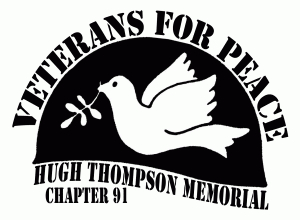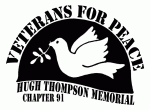On Monday May 28, across our country and here in San Diego, Americans will honor those who have died in our nation’s wars. Most will spend the holiday at family gatherings, spending a day at the beach, and visiting with friends. A few will go to cemeteries, listen to politicians talk of our brave warriors who have died in the service of their country, and pledge to ensure our military will remain the most powerful in the world. Yet, how many of us will contemplate the true cost of wars and ask how we have come to be a nation that is in a state of perpetual conflict?
As we end the war and occupation in Iraq, and seem poised to downsize our military presence in Afghanistan, how many Americans realize we have special operation forces engaged in combat operations of one form or another in as many as 70 countries around the world? Now, President Obama seems prepared to take us to war to keep Iran from possessing nuclear weapons. Our military budget is three times larger than it was at the end of the 1990s. We have spent 1.4 trillion dollars on the wars in Iraq and Afghanistan outside of the military budget. And, now we are told by Congress that the budget deal calling for automatic cuts in defense and domestic spending will endanger our security and, therefore, the defense cuts must be restored or increased.
In 1985, a handful of veterans formed an organization, which has now grown into an international organization, Veterans for Peace. One of the five stated purposes of Veterans for Peace is “To abolish war as an instrument of national policy.” The United States did just that in 1929, with the signing of the General Treaty for the Renunciation of War, commonly known as the Kellogg-Briand Treaty. The treaty was ratified by the US senate and pursuant to Article VI of the US Constitution is the “supreme law of the land”. The treaty contains two operative articles. The first provides that the signatory nations agree to “condemn recourse to war . . . and to renounce it, as an instrument of national policy in their relations with one another.” The second, provides the parties agree that they will settle and resolve, by peaceful means, all conflicts between them of “whatever nature or of whatever origin they may be.” In ratifying the treaty the senate passed two interpretive clauses: the US retains its right to act in self-defense; the second, the US is not required to go to war against any nation that violates the treaty.
The treaty was negotiated by US Secretary of State, Frank Kellogg, and French Foreign Minister. Aristide Briand. For his part, Secretary Kellogg was awarded the Nobel Peace Prize. In accepting this prestigious award Kellogg said the treaty was, “a sacred promise between all nations and all peoples of the world not to go to war for the settlement of differences; to use a common phrase, to ‘outlaw’ war; to make it a crime against the law of nations. . ..”. In 1932, Secretary of State, Henry Stimson writing in Foreign Affairs, stated that parties to the treaty had renounced war, thus rendering war “illegal throughout practically the entire world.” When signatory nations engage in armed conflict, Stimson said, “either one or both of them must be wrongdoers—violators of the general treaty.” Every major nation of the world has signed the treaty, including Iran, Iraq and Afghanistan.
Since 1929, and with the exception of World War II, virtually every war or invasion of a foreign country by the United States has violated Kellogg-Briand. Perhaps on this Memorial Day, we can pause and reflect that for over 80 years the “supreme law” of the land includes a treaty renouncing war; a treaty, which in the words of Secretary Kellogg, is “a sacred promise between all nations and all peoples of the world. . . to ‘outlaw’ war.” The idea that we can end war may seem like wishful thinking. Yet, as President Kennedy so astutely observed, we must not accept the “dangerous, defeatist belief” that “war is inevitable.” Instead, we must resolve that “our problems are man made—-therefore, they can be solved by man.” What better way to honor the fallen veterans of our wars then to call upon our leaders to recommit our nation to the Kellogg-Briand Treaty and renounce war as an instrument of national policy.
Barry Ladendorf,
President, San Diego Chapter, Veterans for Peace








